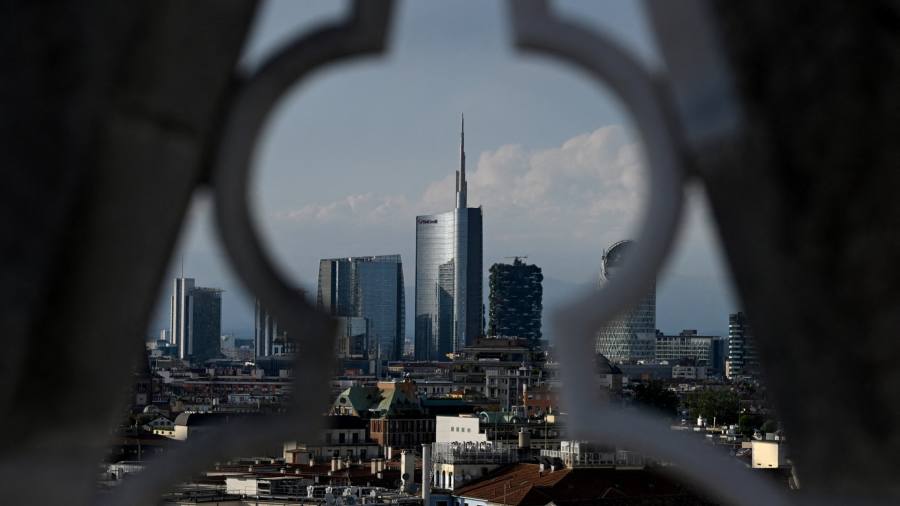Receive free Italian banks updates
We’ll send you a myFT Daily Digest email rounding up the latest Italian banks news every morning.
Italy’s rightwing coalition has surprised markets by announcing a 40 per cent “windfall” tax on bank profits generated by higher interest rates, sending shares in the country’s lenders tumbling.
Shares in Intesa Sanpaolo and UniCredit, the country’s two largest banks, dropped 8 per cent and 6.5 per cent respectively on Tuesday morning after Italy announced the levy on Monday night, saying it would use the expected €2bn to fund relief for families hit by higher interest rates.
Shares in state-owned Monte dei Paschi di Siena fell 7.4 per cent, while Banco BPM, the country’s third-largest bank, shed 8.2 per cent. BPER Banca, Mediobanca and Banca Generali were also down.
Prime Minister Giorgia Meloni’s government has been critical of banks for failing to pass on interest rate rises to small savers, even as they raise lending rates.
The 40 per cent tax, which was approved in a cabinet meeting late on Monday night alongside a flurry of other last-minute measures, will be applied to the net interest income generated from the gap between banks’ lending and deposit rates.
The European Central Bank has raised rates by 4.25 percentage points since last summer, increasing the benchmark deposit rate from -0.5 per cent to 3.75 per cent.
The one-off levy, due by the end of June 2024, will only apply if a bank’s net interest income in 2022 exceeded the level recorded in 2021. The measure must secure parliamentary approval within 60 days to take effect.
There was confusion around the exact specifications of the tax, however. Some bank analysts calculated it could raise far more than the official estimate of €2bn.
Adding to the uncertainty and signalling fractures in the governing coalition, finance minister Giancarlo Giorgetti did not attend Monday night’s cabinet meeting.
Italy’s five largest banks have reported aggregate profits of €10.5bn in the first half of 2023, up 64 per cent from a year earlier, according to rating agency DBRS Morningstar. Performance has been buoyed by higher net interest, resilient net fees and strong cost control, it said.
Banks are likely to resist the retroactive measure, resulting in bitter battles while the government tries to secure parliamentary backing, analysts said.
Deputy prime minister Matteo Salvini said in a press conference Monday night that the tax was “common sense”. The sums raised would fund measures such as tax cuts and subsidies on mortgages for first-time homebuyers, he said, aiming to help families and businesses hit by rising interest rates.
Italy’s foreign minister Antonio Tajani appealed to the European Central Bank last month to stop raising interest rates, saying higher rates were putting a strain on borrowers while failing to curb inflation.
Almost 1mn Italian families missed payments on loans and mortgages in March, totalling €14.9bn as soaring interest rates strained household finances, according to the national bankers’ association Fabi.
Fabi said that borrowers who took out a 30-year mortgage with a variable interest rate in 2021 had since seen their monthly payments double.
Italy’s move has echoes of the Spanish government’s decision last year to levy a windfall tax on bank profits to finance government initiatives to help consumers hit by the cost of living crisis.
Read the full article here




